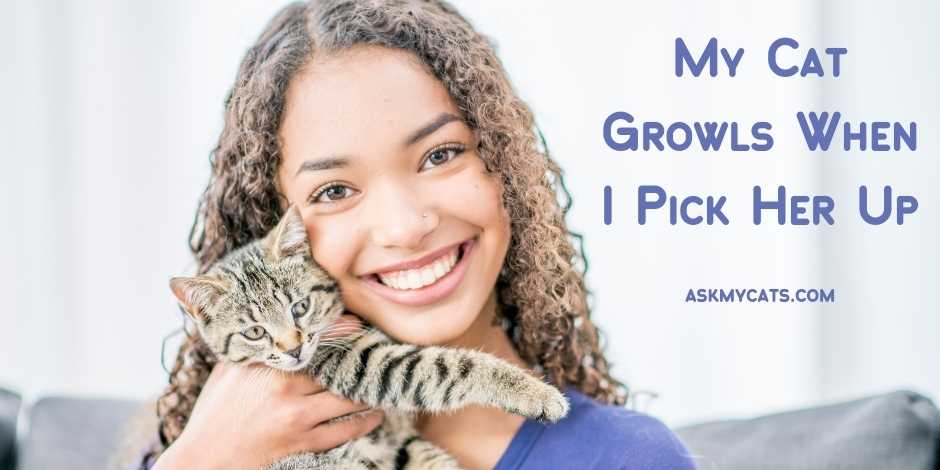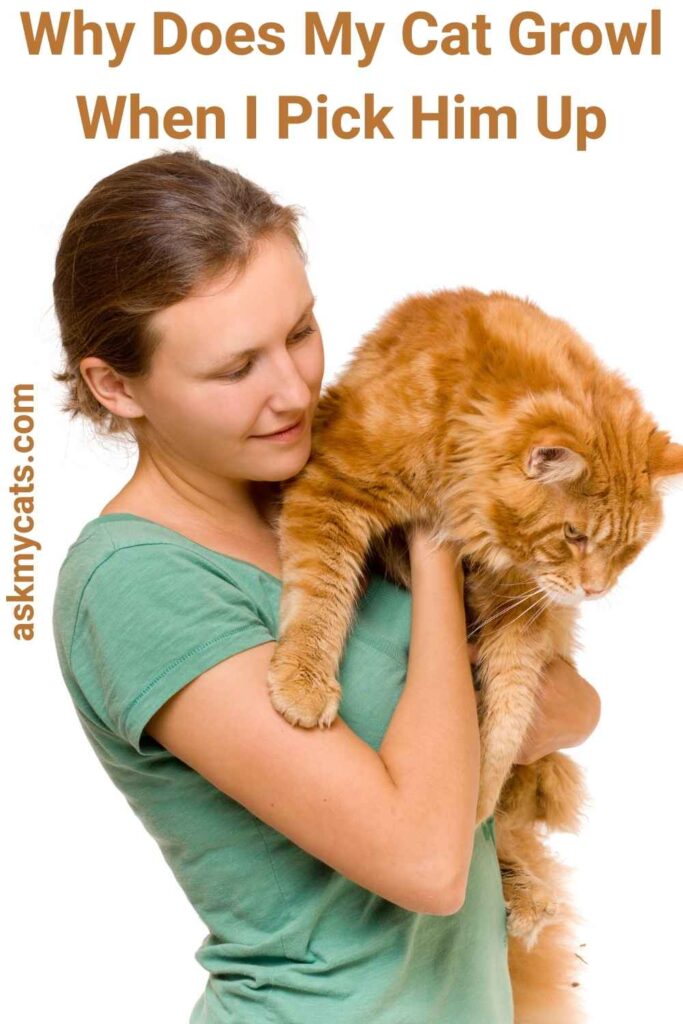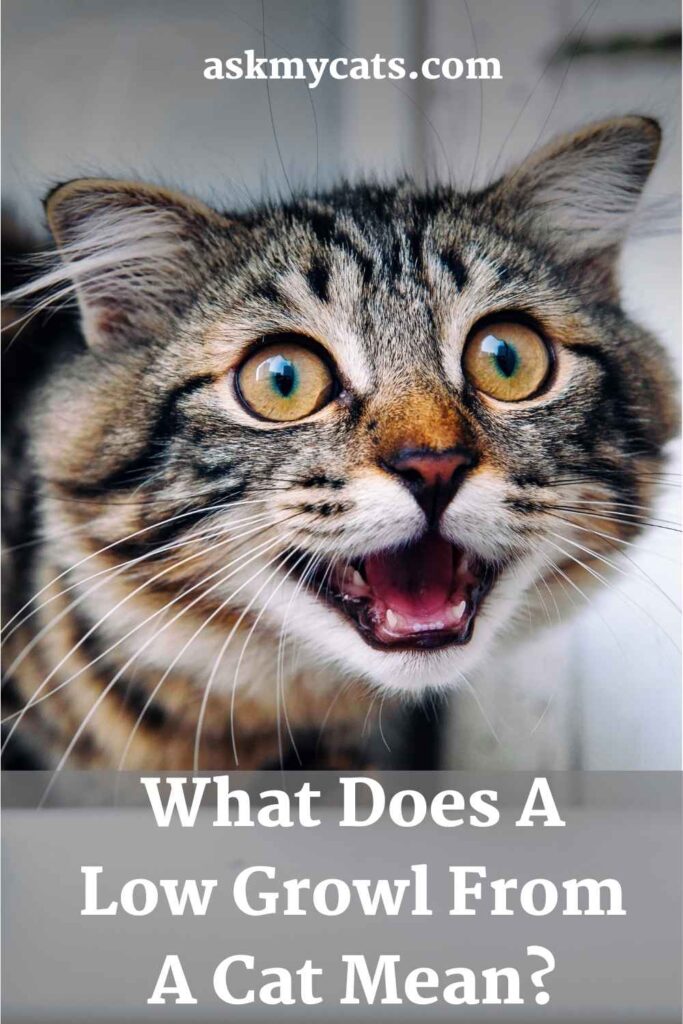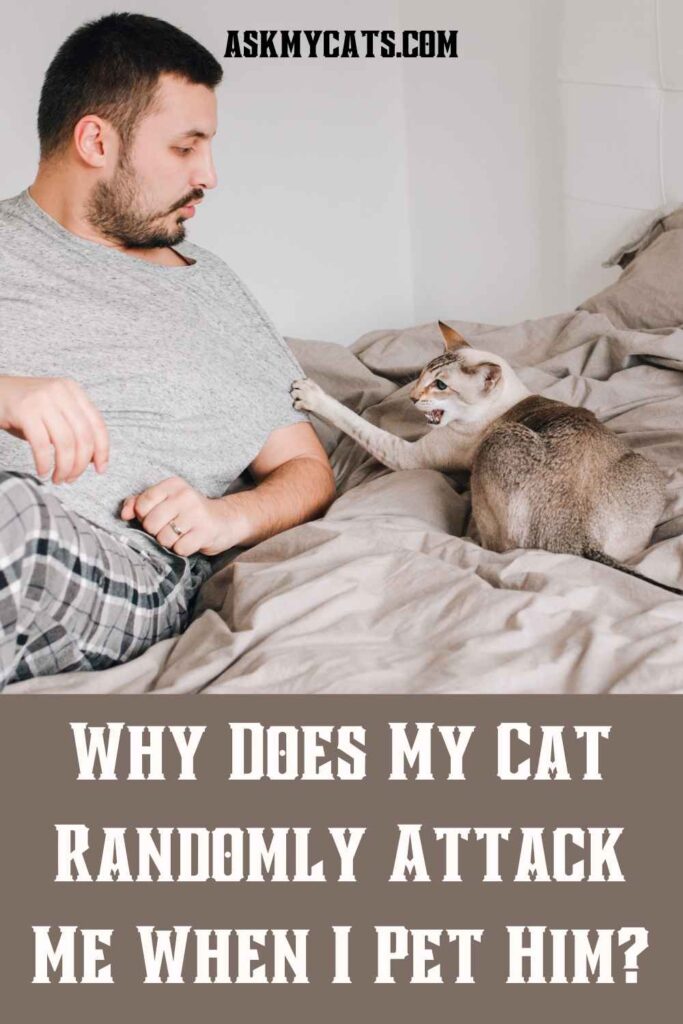A growl is a cat’s conscious response to something that he doesn’t like but can’t save from happening to him. It’s the first symptom of anger.
In those situations, I’m inclined to believe he dislikes being picked up.
Furthermore, it is just out of love for you that he refrains from hitting you.
A cat growls when you pick him up because you are squeezing him tightly and putting pressure on his abdomen, which he simply doesn’t like.


Give Your Cat the Perfect Day
Get the Free Ebook!
Why Does My Cat Growl When I Pick Him Up And Kiss Him?
My cat growl when I pick him up because many cats despise being picked up because it violates their integrity and gives them no leverage.

If a cat approaches you on his own, he would be just as caring as any other cat.
My new Siamese hates being picked up and would try to get down as quickly as she can, only to return a few minutes later to snuggle in the same spot and fall asleep. My last Siamese was a big fan of being picked up.
Cats are almost as unique and autonomous as humans, and wise owners would recognize this and deal with it because there is no such thing as a “just a pet” if you wish to have a relationship with him.
Kissing him has no direct sense because cats show themselves by licking and snuggling; nevertheless, the cheek rub is a way of transmitting fragrance that signifies acceptance as part of the family to an animal.
There’s still the matter of how the cat can be picked up. If you raise the cat by putting both hands around its abdomen, the ‘growl’ may be an unintentional release of air when the chest is compressed.
When lifting and then moving the weight to the back, I like to curl one hand around their back end to support their weight and the other cupped under the chest. She likes you, and the sound you’re hearing is considered a ‘trill.’
Cats hear this sound as kittens from their mother, who uses it to get their attention so they can pursue her; cats see trills as a positive sign.
Cats make the ‘trill’ sound to welcome other cats or humans as adults. Consider it a friendly greeting. It normally indicates that they are content and would like you to pet them.
She needs your love if she starts to trill at you, and she wants to teach you something if she walks away and then returns. It could be as simple as an empty food or water bowl, but it could also be something more sinister.
Your cat may be attempting to communicate with you because she is ill or in distress. Please take her to the veterinarian if this is a possibility.
Excessive trilling may also indicate that your cat is getting older since they are more susceptible to disorientation, uncertainty, and agitation at this age.
My cat used to like capturing mice and little rats and taking them into the house as gifts. He didn’t harm them because he’d never been taught (like most cats, he was ripped away by his mother so she could teach him), so he took them in alive.
He would come up to me and trill at me when he missed them, sometime in the middle of the night, I believe that he had misplaced my present.
I was terrified the first few times, but then I discovered I could trap them in a vase if I turned it on its side, and the little guy would sprint in for safety. Then I’d take it outside and let it free.
Cats are naturally calm, have some natural predators, and depend on hunting to survive, so noisy noises are mostly reserved for emergencies.
Cats, on the other hand, have a special signal for people, who are noisy, stompy, and deaf by cat means. That is the cute little ‘meow.’
It’s a neutral noise that’s distracting enough to get attention but not loud enough or unsubtle enough to be used cat-to-cat.
Some cats can try to modulate it by making the higher-pitched ‘me’ longer when they are pleased with the human and the lower-pitched ‘OW’ softer and longer when they are not, but most humans don’t seem to notice.
However, an ‘mrr’ suffices for cat-to-cat communication. It’s gentle, it’s a greeting, and it’s simply seeing them as friendly.
The eyebrow flash (when you lift your eyebrows when you approach someone you want to remember but don’t need to speak with) is the human counterpart or simply a wink.
Also, check out Cat Growling After Giving Birth: Is It Normal?
What Does A Low Growl From A Cat Mean?
A low-pitched growl normally serves as an alarm, instructing the attacker to back off.

If the dog or other obstacle leaves, the pet would most likely not strike. If it doesn’t, though, the cat would almost certainly take action.
Cats often make growling sounds when they are irritated or try to scare away a possible attacker.
When cornered, kittens and older cats can growl. They’ll hunch their shoulders and puff out their tail and other hair. It’s common for cats to meow in order to get your attention.
However, depending on pitch and length, meow sounds can mean different things at different times. Meows aren’t normally used to communicate between cats.
Short meows, for example, are mostly just a cat’s way of saying “hello.” When your pet meows in a rapid-fire way, he or she is most likely happier to see you than normal.
When your cat meows like this, it’s more likely that you’ve been out for a few hours and your cat has missed you.
However, if the meowing is low-pitched, it is most definitely a form of annoyance. It’s possible that your cat is annoyed. It might be that you’re late for dinner or that you’re not spending enough time with them.
High-pitched and very loud meows may be a sign of frustration or discomfort. Your dog may be bothering the cat, or you may have accidentally stepped on its tail. A hissing cat is a cat that is sad.
Your cat is hissing because it perceives a threat. It’s a sign of anxiety, but it’s also a signal that if necessary, your pet will strike. When cats and dogs don’t get along, the cats will hiss when the dogs get too close.
When a cat is really endangered, though, he or she may sometimes vomit. This indicates that the cat is about to strike. If a cat hisses and spits but the perceived threat persists, a confrontation is almost certainly on the way.
You might also like to read about why does my cat meow when i pick her up
Why Does My Cat Randomly Attack Me When I Pet Him?
My cat randomly attacks me when I pet him because, after a few minutes, the feline companion unexpectedly no longer seems so friendly.

Maybe he will throw you a dirty look, nip or bite, and runoff. For your pet, it’s the same thing. Possibly you don’t know how upset he is.
You should expect a sweet cat that will soon become a lap baby and pet when you get your new kitty home.
However, the cat sometimes has a different notion. Some cats will adore curling up in your lap, while others will be unconcerned.
Cat actions can be perplexing, but felines are incredibly routine animals that seldom do anything for a cause.
You will be able to get your pet to do something else if you can find out why she does what she does.
Your kitty may not be the cat you had hoped for, but he or she would be a wonderful addition to your family.
If your once nice kitty has abruptly turned evil, the first thing you can do is send him to the vet for an examination. He or she may have an ear infection, a toothache, or a urinary tract infection, for example.
An even-tempered cat may become an old grouch due to a variety of painful circumstances. Don’t think you’d know if she was sick because cats are really good at hiding illnesses.
Cats are people that stick to their routines. They have a hard time adapting to transition. Changes can lead to tension, which can lead to a shift in behavior.
Cats, unlike dogs, do not bite out of fear. If a cat is frightened or nervous, she will flee and disappear until she is unable to do so.
Be sure your cat has a quiet place to go when she’s in a difficult environment, such as being with teenagers, other cats or kittens, or dogs or puppies.
Cats that are playful can be very mean. My cats run about chasing each other, jumping off the walls and furniture. It may be frightening at times, but it normally means nothing.
Cats like to expend resources, and one way they do so is by lying in wait and fighting each other.
Kittens and young cats can be abrasive with one another. Kittens, in particular, will engage in chewing and scraping games.
This is how they develop the hunting skills that they would use as adults. Your cat, on the other hand, should not be playing with you in this manner.
Though scratching and biting are natural cat behaviors, your kitten must understand that you are not another cat. You’re not a toy, either.
Never allow your kitten to engage in combative behavior with you. When she’s a kitten, attacking your hand is cute, but when she’s a full-grown cat with full-size teeth and paws, it’s not so much fun.
Keep in mind that cats are highly sensory animals. They can love being stroked and petted for a few minutes, but if it continues for too long, it becomes uncomfortable, even painful.
Imagine someone scratching your arm or back in the same spot over and over again, even though you asked them to stop.
Your cat is in the same boat. You probably have no idea how irritated he is. You presume he enjoys being petted, but he becomes more irritated when he eventually turns around and lets you have it.
Also, check out why does my cat meow when i pet her
How to Change Your Cat’s Aggressive Behaviour?
To change your cat’s aggressive behavior, your cat must learn that he is not allowed to bite or be offensive to you.
It’s up to you to remind your cat that being petted is a luxury, not a right, by reminding him that being petted is a privilege.
1. Petting Sessions
Allow your cat to lie in your lap and softly stroke him around the head and ears when he needs to be affectionate.
Don’t put any restraints on him. Place him down on the floor and play with him or offer him a treat or toy for a short period, until he shows signs of violence.
Before you put him down and play with him, make each petting session a little longer.
2. Look for Signs
Keep an eye on his body language. Stop the session until he bites you if he continues giving you sideways eyes and twitching his tail.
If he bites or attacks you, take him off your lap and make him wait a while before allowing him to return. He wants to understand why you’re the boss.
Your cat will never be a cute, cuddly lap baby, but you will strengthen your relationship with your once evil cat with time and patience.
Frequently Asked Questions
Why is my cat growling at me all of a sudden?
Arthritis, dental disorder, trauma, and parasites are only a few of the disorders that can cause discomfort and resulting aggression when a cat is touched in a sore place or believes he or she is being touched.
Do cats feel love when you kiss them?
Although cats don’t kiss their owners in the common context, they do have a variety of ways to express their affection. When your cat purrs as you pet it in its favorite place, it’s expressing its love and gratitude for you. Although some cats dislike being kissed, the majority of cats love spending quality time with their humans.
Final Words
You’re going to need a quick fix. I can tell there’s more to this from the question. This may be a symptom of infection or a wild cat.
This may be due to a transition in the household, such as the addition of a new human or pet. It’s quite possible that the breed of cat is to blame.
I consider out small and petting the cat before moving on to catching him or her.
He growls because he either doesn’t like it (most cats don’t like being picked up or kissed) or that it affects him.
Gentle strokes from the top of the head to the waist, under the chin, and around the cheeks from front to back are preferred by most cats.
A confident cat even enjoys having his or her back stroked from head to tail.
